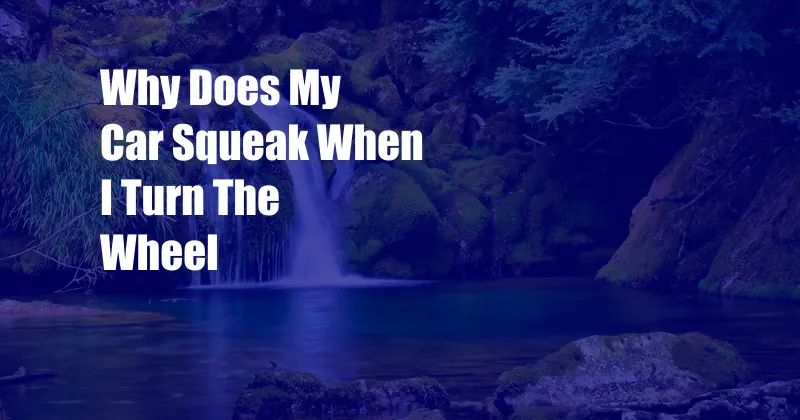
Why Does My Car Squeak When I Turn the Wheel?
As I was driving down the road, I heard a strange noise coming from my car. It was a high-pitched screech that seemed to be coming from the front of the vehicle. The noise would get worse when I turned the wheel, and it would sometimes even make a pop or clunk sound. I knew I needed to get the car checked out, but I wasn’t sure what the problem was.
When I took the car to the mechanic, they told me that the noise was coming from the steering system. Specifically, the noise was being caused by a worn-out ball joint.
Ball Joints
Ball joints are critical components of the steering system. They allow the wheels to turn smoothly and easily, and they also help to keep the wheels aligned.
Ball joints are made up of a ball and socket joint, which is covered by a rubber boot. The ball is connected to the steering knuckle, and the socket is connected to the control arm. When the steering wheel is turned, the ball and socket joint moves, which allows the wheels to turn.
Causes of Squeaking Ball Joints
There are a few different things that can cause ball joints to squeak.
- Wear and tear: Ball joints can wear out over time, which can cause them to squeak.
- Lack of lubrication: Ball joints need to be lubricated properly to work correctly. If the ball joints are not lubricated, they can squeak.
- Damage: Ball joints can be damaged due to various factors, including road hazards and accidents. If the ball joints are damaged, they can squeak.
Symptoms of Squeaky Ball Joints
In addition to squeaking, there are a few other symptoms that can indicate that your ball joints are worn out.
- Loose steering: Worn-out ball joints can cause the steering to feel loose or imprecise.
- Clunking or popping noises: Ball joints can make a clunking or popping noise when the steering wheel is turned.
- Uneven tire wear: Worn-out ball joints can cause the tires to wear unevenly.
What to Do If Your Ball Joints Are Squeaking
If you think your ball joints are squeaking, it is important to take your car to a mechanic right away. Squeaky ball joints can lead to more serious problems, such as a loss of steering control.
The mechanic will be able to inspect the ball joints and determine if they need to be replaced. Replacing ball joints is a relatively straightforward procedure, and it can be done in a few hours.
Tips for Preventing Squeaky Ball Joints
There are a few things you can do to help prevent squeaky ball joints.
- Get regular maintenance: The best way to prevent squeaky ball joints is to get regular maintenance on your car. This will help to ensure that the ball joints are properly lubricated and that they are not worn out.
- Avoid rough roads: Rough roads can put a lot of stress on the ball joints, which can cause them to wear out prematurely. If you can, avoid driving on rough roads as much as possible.
- Get your car inspected if you hear any strange noises: If you hear any strange noises coming from your car, it is important to get the car inspected right away. This will help to identify the problem early on, before it can cause more serious damage.
FAQ
Q: What causes ball joints to squeak?
A: Ball joints can squeak due to wear and tear, lack of lubrication, or damage.
Q: What are the symptoms of worn-out ball joints?
A: The symptoms of worn-out ball joints include squeaking, loose steering, clunking or popping noises, and uneven tire wear.
Q: What should I do if my ball joints are squeaking?
A: If your ball joints are squeaking, you should take your car to a mechanic right away. The mechanic will be able to inspect the ball joints and determine if they need to be replaced.
Q: How can I prevent squeaky ball joints?
A: You can help prevent squeaky ball joints by getting regular maintenance on your car, avoiding rough roads, and getting your car inspected if you hear any strange noises.
Conclusion
Squeaky ball joints can be a nuisance, but they can also be a sign of a more serious problem. If you hear any strange noises coming from your car, it is important to get the car inspected right away. This will help to identify the problem early on, before it can cause more serious damage.
Is there anything else you would like to know about squeaky ball joints? Let me know in the comments below!